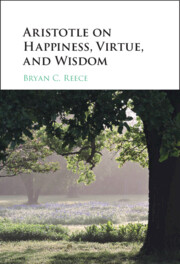Book contents
- Frontmatter
- Dedication
- Contents
- Preface
- Abbreviations
- Chapter 1 From the Dilemmatic Problem to the Conjunctive Problem of Happiness
- Chapter 2 Theoretical and Practical Wisdom
- Chapter 3 Are There Two Kinds of Happiness?
- Chapter 4 Is Contemplation Proper to Humans?
- Chapter 5 Solving the Conjunctive Problem of Happiness
- Bibliography
- Glossary
- Index of Passages
- Index of Authors
- Index of Terms
Chapter 3 - Are There Two Kinds of Happiness?
Published online by Cambridge University Press: 15 June 2023
- Frontmatter
- Dedication
- Contents
- Preface
- Abbreviations
- Chapter 1 From the Dilemmatic Problem to the Conjunctive Problem of Happiness
- Chapter 2 Theoretical and Practical Wisdom
- Chapter 3 Are There Two Kinds of Happiness?
- Chapter 4 Is Contemplation Proper to Humans?
- Chapter 5 Solving the Conjunctive Problem of Happiness
- Bibliography
- Glossary
- Index of Passages
- Index of Authors
- Index of Terms
Summary
It is standardly believed that Aristotle thinks that there are two kinds of happiness, one corresponding to intellectual contemplation and the other corresponding to ethically virtuous activities, and the former kind is superior to the latter. This is the Duality Thesis. It is notoriously problematic and does not follow from anything that Aristotle has said to that point. It also prevents solving the Conjunctive Problem of Happiness. Interpreters have felt forced to affirm the Duality Thesis by its apparent textual inescapability. However, the apparent claim depends on supplying “happy” or “happiest” from the previous sentence, as is standard among translators and interpreters. I argue for an alternative supplement that commits Aristotle to a much less problematic and unexpected position.
Keywords
- Type
- Chapter
- Information
- Aristotle on Happiness, Virtue, and Wisdom , pp. 62 - 79Publisher: Cambridge University PressPrint publication year: 2023

